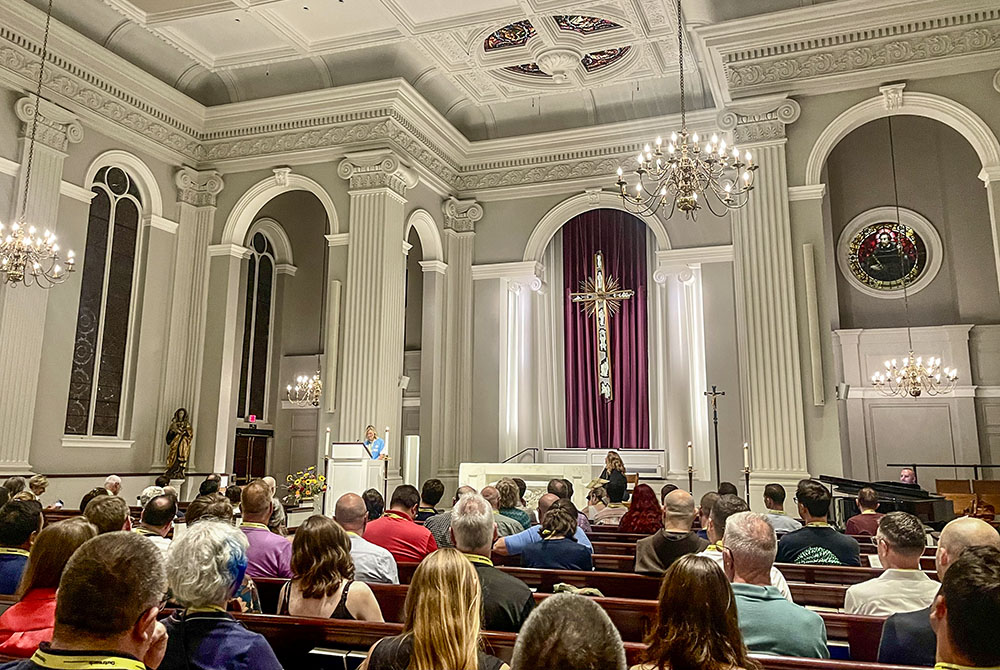
Catholic transgender woman Christina Zuba shares her story during evening prayer Aug. 2 at Holy Trinity Catholic Church in Washington, D.C., as part of the Outreach 2024 LGBTQ Catholic Ministry Conference. (NCR photo/Camillo Barone)
Immediately after the opening Mass of the Outreach 2024 LGBTQ Catholic Ministry Conference celebrated in the chapel of Georgetown University by Washington Cardinal Wilton Gregory, Christine Zuba ran excitedly to greet and hug Fr. Andrea Conocchia. The Italian priest has repeatedly brought a group of transgender women sex workers to visit Pope Francis at the Vatican, and the pontiff has struck up a friendship and correspondence of letters with him.
Zuba, a Catholic transgender woman who is a retired electrical engineer from New Jersey, met Conocchia a year ago at the 2023 Outreach conference and has kept in touch with him through Facebook. As the rest of the conference attendees left the chapel to go to their respective panels, Zuba remained talking and taking pictures with Conocchia standing at the foot of the altar.
Suddenly, the priest proposed something Zuba could never have expected.
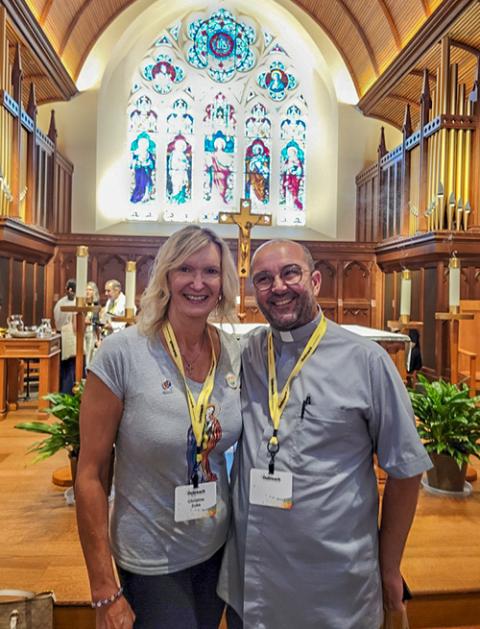
Christine Zuba and Fr. Andrea Conocchia pose for a photo Aug. 3 after Mass during the 2024 Outreach conference. (NCR photo/Camillo Barone)
"Why don't you also come and meet the pope when I go back to him?" he asked her.
The 2024 Outreach conference, Aug. 2-4, brought together more than 400 LGBTQ Catholic laypeople, clergy, scholars, artists, educators, students and family members from all over the U.S. and abroad for more than 10 panels, moments of prayer and spirituality, and social hours.
For the first time since the Outreach conferences began in 2022, this year a cardinal celebrated a Mass for the attendees. In a letter to Outreach founder Jesuit Fr. James Martin, Francis said he was "glad" about Gregory's participation in the conference, adding that he would join him in prayer.
"The presence and the pastoral needs of our LGBTQ sisters and brothers may often be viewed as a volatile topic, but they must be faced with sincerity and genuine compassion," Gregory said in his homily Aug. 3. "I pray that this conference advances that goal and makes us a stronger, holier and more welcoming church and nation."
On Friday night, Aug. 2, Zuba had stepped up to the altar of a packed Holy Trinity Catholic Church in Georgetown during the conference's evening prayer, where between singing and spiritual reflection she shared the story of her transition.
"Even though I've been a lifelong Catholic, I believe my faith journey became reenergized with my transition. When I went to confession to tell the priest that I was transgender, I knew that only my outside was changed. Everything else — my heart, my mind, my soul, my faith — was not changing," she said.
At the end of her speech, resounding applause rose in the church, eventually returning to the silence of prayer.
Zuba said in an interview with NCR that sharing her story at the altar of a church made her feel "blessed," adding that after founding a small LGBTQ ministry group at Sts. Peter and Paul parish in Turnersville, New Jersey, her life found deep meaning in the light of faith. When asked how she felt about the proposal to meet Francis through Conocchia, she wept.
"I cry just thinking about the possibility of letting Pope Francis ask us a question or two about our lives, so that he can better understand us just as children of God," she said.
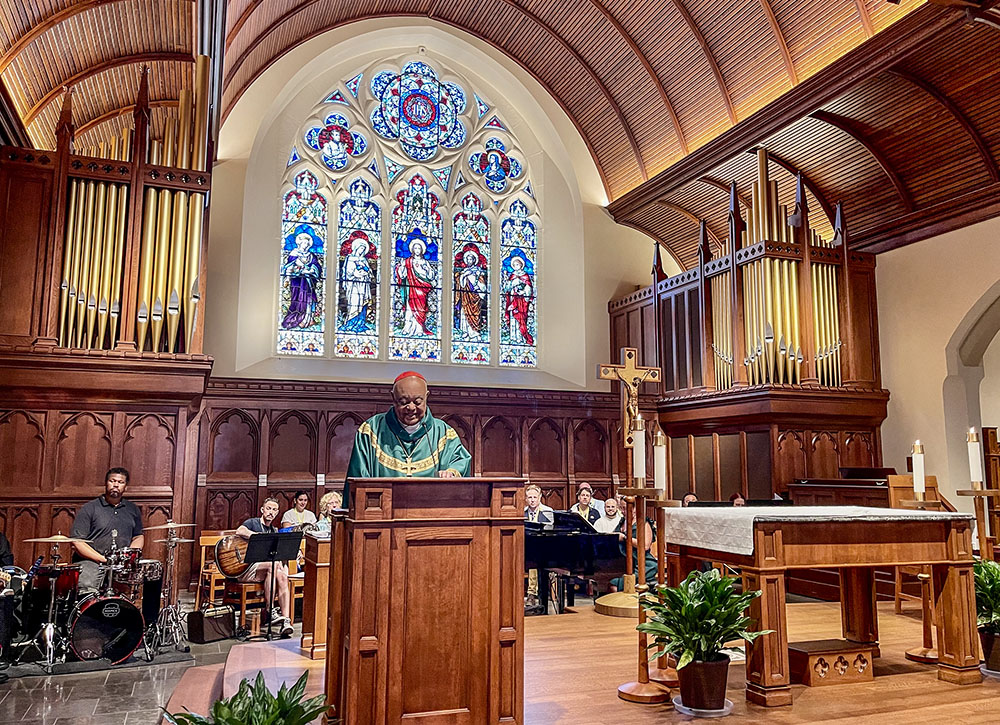
Washington Cardinal Gregory said in his homily at the Aug. 3 opening Mass of the 2024 Outreach conference at Georgetown University that the pastoral needs of LGBTQ Catholics "must be faced with sincerity and genuine compassion." (NCR photo/Camillo Barone)
Br. Christian Matson, a transgender diocesan monk from Lexington, Kentucky — the first openly transgender person in his position in the Catholic Church — also returned to the Outreach conference this year. Over the past two years, Matson made his first profession and subsequently renewed it as a diocesan hermit, with the full knowledge, consent and support of Bishop John Stowe of Lexington, Kentucky.
During this time, Matson has connected with other transgender men who were interested in pursuing consecrated and religious life like him.
This year, five young transgender men joined him at the Outreach conference, where they also had a private retreat. Matson attended the conference with the intent to support these men, help them connect with the broader community, and learn how to better serve the community himself, he told NCR.
He added that the panel on transgender Catholics moderated by NCR staff reporter Katie Collins Scott was particularly enlightening for him, as it underscored the urgency of completing his upcoming book, which presents a theological argument for the inclusion of trans people in consecrated life.
Contrary to Matson's hopes, however, some of the transgender men who want to enter religious life have already been rejected by certain bishops, convents and monasteries after they came out as transgender, even though they are "perfect fits" according to many spiritual directors who spoke with them.
"They just want to serve the church. They just want to be recognized for their love," said Matson to NCR. "These are great men who fully should be in religious communities. They're excellent candidates. The only reason that they're not admitted is because of their medical history, their trans status."
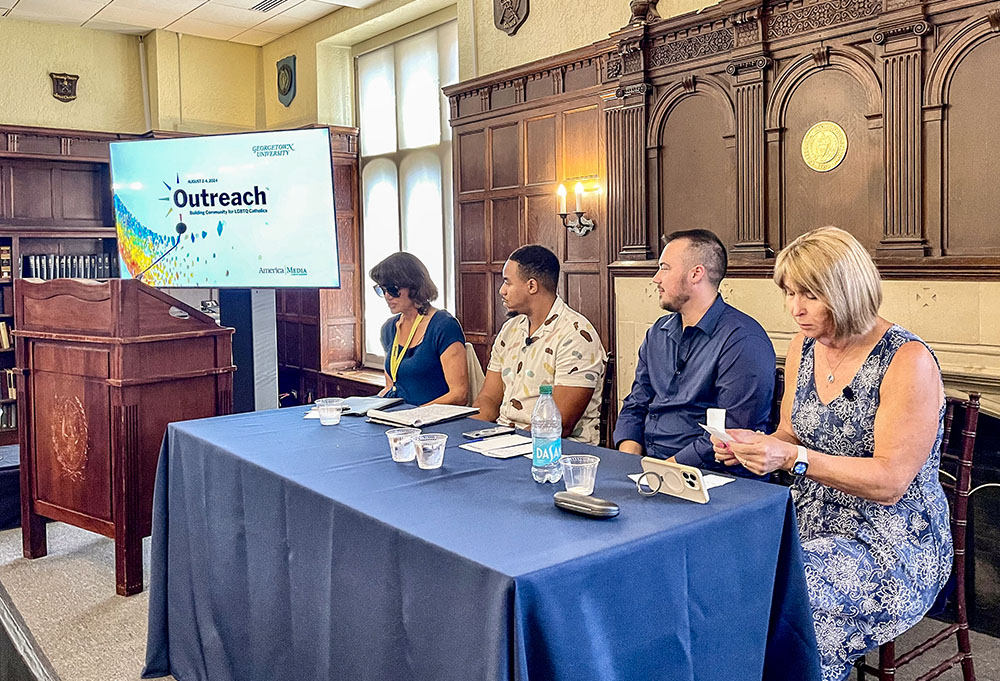
From left: NCR staff reporter Katie Collines Scott; Craig Ford Jr., assistant professor of theology and religious studies at St. Norbert College in De Pere, Wisconsin; Maxwell Kuzma, transgender Catholic writer; and Maureen Rasmussen, senior strategic adviser at Chesapeake Lighting, participate in the 2024 Outreach conference panel "Transgender Catholics and the Church" on Aug. 3. (NCR photo/Camillo Barone)
Craig Ford Jr., assistant professor of theology and religious studies at St. Norbert College in De Pere, Wisconsin, was a panelist on the "Transgender Catholics and the Church" panel. He said that a recurring question he got from attendees of the conference was, "How can ministries be made more welcoming for trans and non-binary individuals?"
This question, he believes, reflects that "they want a place trans and nonbinary people can call home, and that they want to do that within the confines of the Catholic institution."
The resilience of the LGBTQ Catholic community despite rejection from the institutional church was a recurring theme in most of the panels at the Outreach conference.
"The religious right and the U.S. Catholic bishops have a certain story that they tell, but overwhelmingly the people in the pews are with us. They support LGBTQ people, they support us accessing the sacraments," said Meli Barber, president of DignityUSA, a prominent LGBTQ Catholic organization that was founded in 1969.
On the panel "Catholic LGBTQ Women and the Church," Barber shared her story of being an LGBTQ Catholic who had to leave her career as a religious educator and youth minister to marry her wife.
Advertisement
"I decided to stay in the Catholic Church because it's where I come from and where I belong," she told NCR. "I'm here. I'm queer. And it's my baptismal right, so I'm not going anywhere."
According to 32-year-old attendee and Denver-based gay Catholic Justin Telthorst, many LGBTQ individuals are missing from the church because they have been made to feel unwelcome, were pushed out or were lost to suicide. For this reason, Telthorst launched a new platform called Empty Chairs, a project designed to advocate for more inclusive pastoral care for the queer community and to build a bridge between the official teachings of the church on gender and sexuality and the desires of its queer members.
Telthorst, who is a survivor of conversion therapies, told NCR that even today the biggest challenges in his work and life as a gay Catholic are the assumptions and prejudices the rest of the Catholic community has about him and his intentions.
"I try to write with nuance, but the internet isn't always the best place for nuance," he said. "It's hard when people accuse me of wanting to just change the church or corrupt people. It's hard when people assume the worst when I really do want to build bridges. I really do want to foster communication."
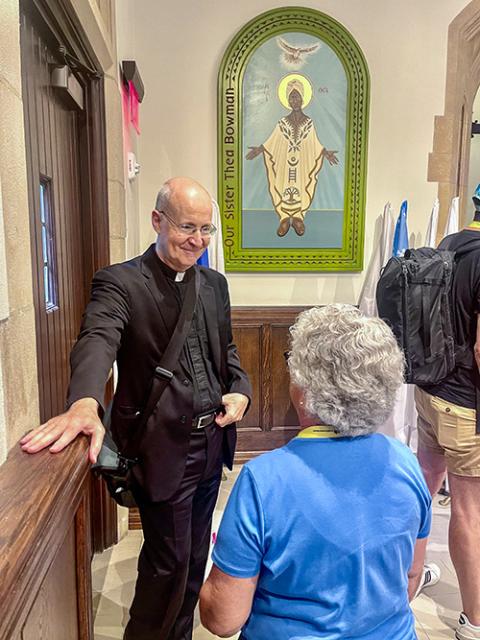
Outreach founder Jesuit Fr. James Martin speaks with an attendee on Aug. 3 during a break at the 2024 conference at Georgetown University. (NCR photo/Camillo Barone)
Ivan Briggiler, founder of the LGBTQ ministry at the Church of St. Ignatius of Loyola in New York City, was one of the few panelists invited to speak on two different panels: "LGBTQ Ministry in Parishes" and "Parenting LGBTQ Children." When Briggiler's son came out as gay, Briggiler initially processed the news internally, contemplating how God would want him to deal with the situation, he told NCR.
Over time, however, his search for understanding evolved from a personal journey to one rooted in community. Briggiler decided to explore this issue within his welcoming parish community at St. Ignatius. He approached the pastor and asked why there was no LGBTQ ministry at the church.
His involvement deepened after attending an event in Baltimore in 2016 where Fr. Martin received an award from New Ways Ministry. During the return car trip to New York, Martin, Briggiler and his son discussed how to continue their efforts, ultimately deciding to start an LGBTQ ministry at St. Ignatius.
Eight years later, at the 2024 Outreach conference, Briggiler gave advice to parents, allies and priests on how to welcome their children as they are and how to make sure that they do not feel alone in their parishes, so that they do not leave the church forever.
"My kids are not my kids. My kids are first of all God's creation," he said. "My advice to every parent struggling with accepting their LGBTQ kids would be to use this as an opportunity to explore your spirituality and to strengthen your communication with God. He is blessing you through your LGBTQ kids."








